

Rethinking Objective Journalism. July 8, 2003 | Like this article?
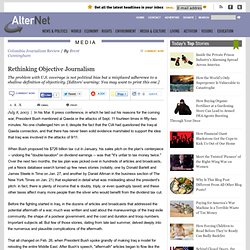
Join our email list: Stay up to date with the latest headlines via email. In his Mar. 6 press conference, in which he laid out his reasons for the coming war, President Bush mentioned al Qaeda or the attacks of Sept. 11 fourteen times in fifty-two minutes. No one challenged him on it, despite the fact that the CIA had questioned the Iraq-al Qaeda connection, and that there has never been solid evidence marshaled to support the idea that Iraq was involved in the attacks of 9/11.
When Bush proposed his $726 billion tax cut in January, his sales pitch on the plan's centerpiece -- undoing the "double-taxation" on dividend earnings -- was that "It's unfair to tax money twice. " The Media - Objectivity. Journalists often claim that their own biases and the pressures from advertisers and media owners do not affect their work because of their professional norm of 'objectivity'.
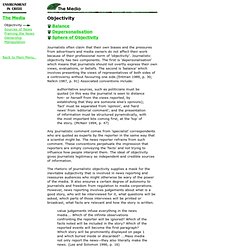
Journalistic objectivity has two components. The first is 'depersonalisation' which means that journalists should not overtly express their own views, evaluations, or beliefs. The second is 'balance' which involves presenting the views of representatives of both sides of a controversy without favouring one side. (Entman 1989, p. 30; Nelkin 1987, p. 91) Associated conventions include: FOX News, MSNBC and Objectivity - Objectivity in Cable News. This is a confusing time for journalism students.

Professors stress the importance of objectivity in reporting, but some of the most prominent journalists in the country - the hosts of cable TV talk shows - are anything but objective. So what's going on? What's going on is that two of the three main cable news channels - FOX News and MSNBC - have discovered that opinion-based talk shows get high ratings. High ratings mean more money for these networks, so there's little incentive for either FOX or MSNBC to change their formats any time soon. The Bias of Objectivity in U.S. Journalism. Scholars who study journalism, myself included, have found that efforts by journalists to stay neutral often backfire, resulting in exactly the opposite effect they desire.

Journalists, for example, may try to balance “both sides” of a contentious issue, seeking out authoritative sources to give a credible account of each position. Impartiality: The Foxification of news. Without Computer Security, Sources’ Secrets Aren’t Safe With Journalists. Journalistic Objectivity: “Getting the Best Obtainable Version of the Truth”
Text of Speech at the Indymedia Conference – Nov. 13, 2010 Objectivity does not exist, in journalism or in any other sphere.
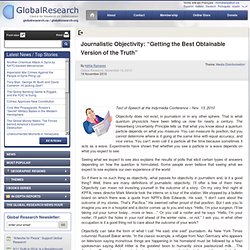
That is what quantum physicists have been telling us now for nearly a century. The Heisenberg Uncertainty Principle tells us that what you know about a quantum particle depends on what you measure. You can measure its position, but you cannot determine where is it going at the same time with equal accuracy, and vice versa. You can’t even call it a particle all the time because sometimes it acts as a wave. Seeing what we expect to see also explains the results of polls that elicit certain types of answers depending on how the question is formulated. Language, Politics, and Journalistic Objectivity. Public Journalism and the Problem of Objectivity. Rethinking Journalism Ethics, Objectivity in the Age of Social Media.
In response to the rapidly changing media environment, many schools and academic programs are offering novel approaches to journalism education.
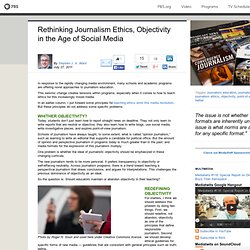
This seismic change creates tensions within programs, especially when it comes to how to teach ethics for this increasingly mixed media. In an earlier column, I put forward some principles for teaching ethics amid this media revolution. But these principles do not address some specific problems. Whither objectivity? Today, students don’t just learn how to report straight news on deadline. Schools of journalism have always taught, to some extent, what is called “opinion journalism,” such as learning to write an editorial that supports a candidate for political office. Questioning Journalistic Objectivity. Journalism, as we've known it, has been mourned deeply over the last few years.
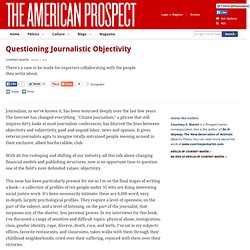
The Internet has changed everything. "Citizen journalism," a phrase that still inspires dirty looks at most journalism conferences, has blurred the lines between objectivity and subjectivity, paid and unpaid labor, news and opinion. It gives veteran journalists agita to imagine totally untrained people messing around in their exclusive, albeit hardscrabble, club. With all this reshaping and shifting of our industry, all this talk about changing financial models and publishing structures, now is an opportune time to question one of the field's most defended values: objectivity. This issue has been particularly present for me as I'm on the final stages of writing a book -- a collection of profiles of ten people under 35 who are doing interesting social justice work. Principles of Journalism.
The first three years of the Project’s work involved listening and talking with journalists and others around the country about what defines the work.

What emerged out of those conversations are the following nine core principles of journalism: 1. Journalism’s first obligation is to the truth Democracy depends on citizens having reliable, accurate facts put in a meaningful context. Journalism does not pursue truth in an absolute or philosophical sense, but it can–and must–pursue it in a practical sense. 2. While news organizations answer to many constituencies, including advertisers and shareholders, the journalists in those organizations must maintain allegiance to citizens and the larger public interest above any other if they are to provide the news without fear or favor. 3.
Journalists rely on a professional discipline for verifying information.